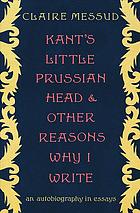
Kant's Little Prussian Head and Other Reasons Why I Write
An Autobiography in Essays
کتاب های مرتبط
- اطلاعات
- نقد و بررسی
- دیدگاه کاربران
نقد و بررسی

Starred review from June 8, 2020
In this moving and evocative essay collection, novelist Messud (The Burning Girl) reflects on family, art, and why she writes. Her essays conjure up an itinerant 1970s childhood—moving from the U.S. to Sydney, Australia; visits with her maternal grandmother in Toronto; and summers with her paternal grandparents in Toulon, France. She illuminates the two women who shaped her—her fiercely traditional French Catholic “spinster aunt,” and her mother, discontented with having given up career for family. Reflecting on family vacation trips to the world’s incipient hot spots—in Ethiopia, Guatemala, and Sri Lanka, among others—she discovers that regardless of differing ideas or “strangenesses of culture... always at the heart are the ordinary people, and there is just life, being lived”—good preparation for becoming a novelist, she says. Art, she writes, has the power “to alter our interior selves,” and she offers nuanced appreciations of, among others, Camus, like her father a Frenchman born in colonial Algeria; Valeria Luiselli, who tries to find new ways to “document” the present; and Marlene Dumas, a figurative painter “driven by gesture, and serendipity... and by the confluence of diverse inspirations.” These intimate, contemplative and probing essays reveal Messud’s rich inner life and generosity of spirit.

July 1, 2020
A collection of essays fired by "the heartfelt conviction that nothing matters more" than "the power of the word." Messud sets the tone in her impassioned introduction, proclaiming the importance of literature "in a period which can feel like the dawn of a new Dark Ages." Literature connects us to the experiences of others both past and present, she declares, engaging writer and reader in a vital exchange. Part 1, "Reflections," opens with a suite of beautiful memory pieces about a peripatetic childhood--Messud had lived in three different countries and attended five different schools by the time she was 12--that left her with a permanent sense of being an outsider and the conviction that the inner life was the most important. Her parents, a Canadian woman who married a "pied-noir" displaced by the Algerian war for independence, shared this conviction: Messud pays tribute to the knowledge of the female literary tradition she acquired at her "Mother's Knee"; and "The Road to Damascus," a painful, moving piece about her father's death, recalls his lifelong immersion in scholarship about the Middle East, sparked by his childhood in Beirut and Istanbul. The critical pieces in the second and third parts discuss individual works by literary and visual artists as varied as Albert Camus, Jane Bowles, Saul Friedlander, Alice Neel, and Marlene Dumas; the author discerns a common thread in their ability to convey their personal experiences and connect them to larger issues in the world. Messud seldom refers to her own accomplished fiction, but her sense of kinship with fellow writers is palpable, and a short, smart piece on "Teenage Girls" reveals the personal origins of her most recent novel, The Burning Girl (2017). The title essay, riffing on a comment in Thomas Bernhard's novel The Loser, affirms that "even a single successful sentence can be transformative." We can take that as Messud's credo. Powerful and inspirational: Messud is as fine a critic as she is a novelist.
COPYRIGHT(2020) Kirkus Reviews, ALL RIGHTS RESERVED.

October 1, 2020
Exceptionally astute, artistic, and eviscerating novelist Messud (The Burning Girl, 2017) gathers essays and reviews in a collection that affirms the significance and power of original expression of authentic experience and the sheer pleasure of reading. Messud's works of finely wrought family history, depicting her Canadian mother's world and that of her French Algerian father, who took the family to global hot spots on curiously risky vacations, are candid and spellbinding. Clearly Messud's sharp observational skills were honed by competing family heritages and sensibilities during her cosmopolitan upbringing, and she also contemplates the impact of her youthful reading of women authors. As she picks apart a jumble of memories, feelings, and facts, Messud's personal essays are, by turns, mischievously funny, emotionally wrenching, and elegantly intellectual. In her criticism she writes of Albert Camus (whose background mirrors that of her father), Kamel Daoud, Jane Bowles, Teju Cole, and Carnegie Medal winners Valeria Luiselli and Sally Mann. Writing of our dark and riven times before the full misery of our current predicament, Messud steers us to the light of forthright inquiry, truth, and beauty.(Reprinted with permission of Booklist, copyright 2020, American Library Association.)

























دیدگاه کاربران